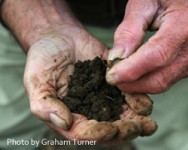Event Details
Date
April 15, 2016
Time
1:00 PM - 3:00 PM
Location
Roy and Sylvia Stutzman Farm
10501 Rogers Rd
Fillmore, NY 14735
Host
Cornell Vegetable Program and CCE Allegany CountyLynn Bliven
585-268-7644 x18
email Lynn Bliven
Understanding and Managing Soils for Top Vegetable Production
April 15, 2016
What is soil? It's not just dirt! Soil is made up of minerals, live and dead organic materials, and pore space (for air and water). The proportions and interactions of these parts determine whether a soil is healthy, supporting top vegetable production, or is in poor health, resulting in crop stress and increased soil-borne disease. Extra fertilizer can't make up for poor soil health!
This workshop will cover the biology, physical condition, and chemistry of a healthy, productive soil. The Cornell Soil Health Test will be described, and examples of test results for area farms will be shown. Ways to improve the health and productivity of your soil will be discussed. How to sample soil for accurate nutrient analysis will be demonstrated. The Cornell pH Test Kit (do-it-yourself) will be shown, and participants will have the opportunity to test their own soils. Be sure to bring a soil sample! Part of this workshop will be in the field or high tunnel.
Preregister or walk-in. Preregistration is helpful for determining the number of handouts needed, as well as the number of chairs. Contact Lynn Bliven, CCE Allegany County, via email or 585-268-7644 x18.
Directions to the farm: Roy & Sylvia Stutzman Farm, 10501 Rogers Rd., Fillmore, NY 14735
From Rt. 19 just north of Fillmore, go west on Allegany Co. Rd. 23. Turn right onto Cemetery Rd./Rogers Rd. Farm is on the left.



































